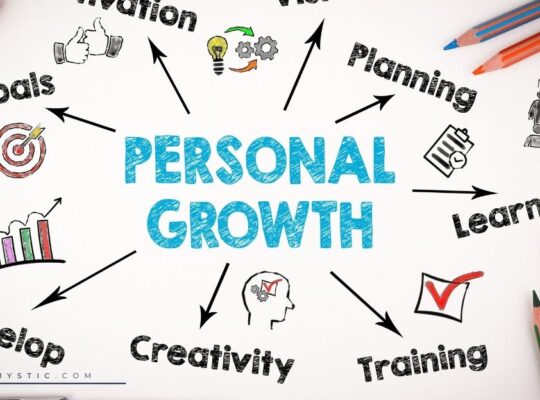What is Personal Growth and Development
What do we mean precisely by personal growth? What constitutes development? This is a broad term that encompasses the activities you engage in that are intended to improve your sense of self, your self-awareness, your potential or capabilities, or your knowledge. The goal of personal development is to improve your quality of life (i.e., make you happier) and to help you achieve your goals and dreams.
Personal development is not something you do for a bit and then stop. It is not something that is ever “finished.” Instead, growth should be considered a lifelong process, one that you work at each day of your life.
Your personal development can focus on any one of the components of well-being, which include:
- Physical health
- Mental health
- Emotional health
- Financial well-being
- Social wellness
- Intellectual well-being
- Spiritual health
- Vocational well-being
- Environmental wellness
Included in the work of personal growth is the evaluation or assessment of your current traits or skills, refinement of your goals and aspirations, and strategies and habits that help you maximize your potential and reach your aims in life.
The activities that are included under this umbrella term are varied and include everything from improving your self-awareness to increasing your vocational skills to enhancing your relationships with others.
So, in a nutshell, personal development and growth are the things you do as an adult that allow you to keep learning and growing throughout your life, and that helps you realize your dreams. We are not “finished” products after childhood, and this category of activities represents all the ways that the human mind and soul evolve and mature throughout our lives in response to our needs and the circumstances of our lives.
Why Personal Growth is Important and Should Not Be Ignored
Why do we need to change and grow? And why is paying attention to our personal development an essential part of life? Below we examine some key benefits, and later, we delve into our understanding of human needs to see from where the origins of personal development come.
It Increases Your Self-Awareness
To begin the process of personal development, you first must know yourself and understand your strengths and needs. Self-awareness is crucial for growth to really occur, so when you invest in improving yourself, you are much more likely to know yourself better. Self-awareness is not just about understanding your traits and capabilities, though. It is also about understanding your beliefs and values, figuring out your purpose and ambitions, and clarifying your habits and actions.
Happiness is achieved with everything in your life is in balance. That means your actions align with your values as well as your goals. It means your goals support your beliefs. It means that what you are doing is furthering your potential and your dreams. And when you focus on this, you can’t help but get to know yourself better and improve your self-awareness.
What happens when you do not know yourself? You end up making poor decisions, engaging in destructive behaviors, or you flounder in roles and relationships that are not right for you. A lack of self-awareness leads to discontentment and a lack of fulfillment in your life. You end up chasing dreams that are not yours, following paths that do not make you happy, and choosing to spend time with people who are not healthy for you.
It Provides You with Motivation
Because the purpose of personal growth is to help you realize your goals and achieve your dreams, it can help you feel more motivated to work hard to get what you want. The process of growth and development helps you clarify your goals and construct a plan of action. Once you see where you want to go and the benefits of any effort you will need to put forth to get there, you will be more motivated to do what is necessary to attain it.
Willpower and determination, therefore, are born from personal growth. When you pinpoint your goals and are able to visualize how your life will be once you reach it, it becomes a powerful source of motivation that can help you overcome obstacles and find solutions for setbacks that you will encounter along the way.
Without a focus on personal growth, you will end up stuck in the same life, never setting important goals for yourself or putting forth an effort to realize a dream that may be hard to reach.
People who say they are “stuck in a rut” understand this feeling. Without motivation, you can give up easily when faced with adversity or refuse to take risks because the effort is too great. When you lack a focus on personal development, you will not be motivated to strive for anything new or to reach past your current situation.
It Guides Your Decisions
When you commit to improving your life, that resolution can then guide you toward making better decisions for yourself that will positively influence your life. Personal development helps you clarify your purpose and goals, realize your strengths, and identify areas for improvement. Once these are clear, you can use that information to help you decide what you need to do to make it all happen.
Commitment to personal growth becomes the driving force in your life, a priority rather than an afterthought. Once you realize that the most crucial thing in life is your own success and happiness, you know that all other decisions should come last. And placing yourself at the forefront of your priorities allows you to let go of other things in your life that are occupying time but not fulfilling your dreams.
Without a growth mindset, your decisions are guided by others’ goals, the whimsy of fate, or the path of least resistance. All of these will end up leading to a feeling that something is missing in your life, and soon you will wake up and realize the thing that is missing is you! Becoming an active participant in your life and decisions is crucial, and self-improvement work can lead you there.
You Can Create Stronger Relationships
When you focus on improving yourself and making the most out of your life, you also improve the lives of those around you. Those who are committed to personal growth are engaged in a positive effort to realize goals and change their lives for the better.
That means you no longer have time for the negative behaviors, emotional outbursts, and fruitless blaming and complaining that you did before. The more positive you are, the more welcoming you are to be around.
Those who improve themselves are more likely to encourage others to work on their personal growth, as well. And once you are committed to improving your life, you soon start to realize that there are some people in your circle that are not bringing you positivity or value.
Once you see this, you can choose to remove those people from your life, which has a positive effect on you and your other relationships. Being interested in achieving your goals also makes you more interested in helping those around you achieve theirs, which makes you a more giving, helpful, considerate partner to those in your life.
When you avoid personal growth, you may find yourself in relationships and nurturing connections with people that are not healthy for you, that encourage your bad behaviors, or who do not value the same things you do.
And ignoring your personal needs shows others that they can ignore them, as well, and you lack boundaries for how you expect to be treated by others. Over time, this erodes your self-confidence and contributes to your ever-evolving unhappiness. A lack of focus on your needs and goals means you may not create relationships that are mutually beneficial or that honor your values.
You Develop Stronger Resilience
A focus on personal growth and development makes you stronger and more resilient to life’s challenges and adversities in several ways. First, when you appreciate and value lifelong learning, you realize that there are many solutions and possibilities for solving problems and that your ability to see opportunities gives you the capability to find those in any situation. Because you are more self-aware and have a better idea of your strengths, you are also more likely to see how you can find resolution or overcome obstacles in any situation.
Resilience includes your ability to stay motivated through a crisis, and those with a growth mindset and a focus on their personal growth value these setbacks in life as a chance to learn, which keeps them motivated to persevere.
And because those interested in growth realize that life is imperfect, and people will make mistakes, failures and setbacks are less likely to derail their confidence or ability to find answers to their problems. When you engage in personal development work, you learn to manage your emotions in productive ways, as well, which can keep you cool and calm under pressure.
Those who ignore their personal development needs may find that a setback or obstacle can completely derail their plans in life. When you lack confidence in your own ability to overcome defeat, you can become afraid to try new things or attempt harder goals, as well. A lack of resilience affects everything from your career to your relationships, and when you do not pay attention to your self and your needs, it will be hard to be resilient to the obstacles that life offers us all.
You Become More Effective and Focused
When you are engaged in the work of personal development, you become focused on the quality of your life and improving it. Personal growth work gives you a sense of direction in your life and allows you to concentrate on what is important to you. And when you finally realize your goals in life, you become more engaged in meeting those than in other pursuits that may have merely been ways to pass the time previously.
When you focus on your personal growth, you gain clarity about what is important to you. This gives you a clear path that will guide your choices and the ability to fend off distractions that are keeping you from realizing your goals. The more you see the benefit of doing something, the more likely you are to stick with it and keep working hard, which is exactly what a commitment to personal development can give to you.
When you avoid personal growth, you will lack direction and clarity about what is important to you, which can lead you to wander aimlessly through your life. You may fill your days with activities that are distractions that will never bring you real joy, and you will likely find that you spin your wheels when it comes to making progress toward goals that are important to you.
The Need for Self-Actualization
To truly understand the most significant danger in avoiding personal growth, though, you must understand self-actualization. To describe this, we will explain the research and theory of Abraham Maslow, who is famous for his theory of the hierarchy of needs.
According to Maslow, all humans have specific needs that must be met for us to be healthy, safe, and happy. And these needs are hierarchical, which means that some must come before others. To illustrate this, you may recall seeing a drawing of a triangle or pyramid, one that has a broad base but that narrows to a point at the top.
If you consider this analogy, then, the bottom of our triangle represents the most basic needs we all have for survival. Among these are food, shelter, water, and sleep. Until we meet these needs, nothing else really matters because these are ones we cannot live without. This is why children who live in poverty struggle to learn because they are often consumed with worry over whether their basic needs will be met.
Moving up the triangle, the next category of needs are those relayed to physical and financial safety. Do I have a safe place to stay? Is my life, or are my belongings in danger from others? Do I have enough money to support my needs? Maslow described this category as the need for security, order, law, stability, and freedom from fear. If you are always afraid that you are in danger, you have a challenging time meeting other goals in your life.
The next level relates to our need for love and belongingness among our fellow men. After we have met our physical and safety needs, we focus on our interpersonal relationships, which include friendships, family, intimacy, acceptance, and trust. Being a part of a group is important, as is being able to receive and give affection to others.
Next, we move up to what are known as our esteem needs. In this category, we find our need for self-esteem as well as our need to be respected by others. In this category are those efforts we make to improve our confidence, our independence and mastery, and to enhance your reputation among those we admire.
All these levels thus far are what are known as deficiency needs. That means that as each of the requirements are met, our motivation to attain them decreases. Once we feel safe in our ability to get food and water, we are less motivated to worry about it.
Once we have a sense of belonging, we stop seeking it so much. Once our self-esteem is secure, our motivation to increase this slows down. All these needs must be met for us to reach the top level of the hierarchy, which is self-actualization.
According to Maslow, the ability to self-actualize is whether someone can “become everything that they are capable of becoming.” This is the goal of self-development work and is simply your ability to feel fulfilled and to reach your full potential, whatever that may be for you. Working toward self-actualization means working up to your potential, finding what fulfils you, and seeking experiences that will help you grow.
Self-actualization is not a deficiency need, like the other levels. Instead, it is called a growth need, which means that the more you get of it, the more motivated you are to achieve it. That is, working toward self-actualization because motivating the more you realize you can achieve it.
The connection to your personal growth journey here is clear. When you avoid growth actions and goals, there is a good chance you are ignoring your basic needs. And by avoiding these, you are preventing yourself from achieving self-actualization. And only through discovery, learning, and growth can you ever hope to achieve this level, which is the pinnacle of human need.
So, consider Maslow’s hierarchy when you start setting self-improvement goals for yourself. Are your needs being met at those lower levels of the triangle? If not, start there. Once your survival and safety needs are addressed, focus on your belonging and esteem. Without these, self-actualization will remain an elusive goal. Finally, once you have met the requirements of deficiency, you can start to focus solely on those growth needs, which leads you to your full potential.
Why We Place Our Personal Needs Last
It is true that most of us already realize why personal development is important and that our growth needs should take priority in our lives. We have heard the reasons why these are important; we know what all the smart people have to say. So, why is it, then, that we continue to ignore what is best for us and place our personal needs last in our lives? Why is it so easy to ignore personal development?
Well, there are actually lots of reasons why people choose to avoid or ignore their needs or to place their personal growth goals on the backburner of their lives. And when you recognize your intentions on this list, maybe you will begin to take the time you need to care for your personal growth and attend to your needs.
You Expect Others to Take Care of You
When you avoid your own needs in favor of someone else’s, you may assume that your sacrifice for them will eventually mean that they return the favor and help you out. While this is an excellent idea, in theory, it rarely works out that way. While it is fine to want to be kind to others, giving of yourself so much that you sacrifice yourself is not doing you or them any real favors. Choosing to sacrifice yourself and your personal growth for someone else’s needs enables them to treat you like a doormat, to take advantage of your generosity, and to assume that you will always be there without hesitation.
When it comes to life lessons, one of the most important ones you can learn is that the only person you can truly count on in life is yourself. The only person whose job it is to care for you is yours. The only person you can rely on to be there when you need it is you. Waiting around for others to take care of your needs will leave you frustrated and resentful.
You Think Others Will View You as Selfish
This is one of the number one reasons people choose to avoid taking care of their needs. The worry about what others think or assume about you is intense for many people, and they equate self-care with selfishness. But it is actually the opposite that is true. Taking care of your needs is not selfish. It is the right thing to do. When you are stronger and happier, you have more to offer other people, and you can give more of yourself in meaningful ways.
Taking care of your needs for growth and learning helps you reduce stress, cope with adversity, overcome obstacles, and be better equipped to help others in your life. If it helps, you can use the airplane analogy. You can’t help others in the event of an emergency unless you put on your own oxygen mask first. Focusing on your needs enables you to care for yourself as well as others, which is never a selfish thing.
You Think Your Goals Aren’t Important
A lot of people choose not to focus on improving themselves or enhancing their happiness because, deep down, they don’t believe that they are worthy of those things. When you lack self-wroth, it is hard to believe that our goals are important, that our happiness matters to others, or that we are worthy of achieving our goals. Those who do not love themselves are often the first to ignore their personal needs in favor of those of others.
Learning to love yourself is a huge part of personal growth. And, once you see that you are worthy of everything you want to achieve, you will see that working toward your goals and focusing on your improvement are the MOST critical goals you can have.
You Are Too Busy “Saving” Other People
Another common reason people choose to avoid their own personal growth is that they are too focused on helping other people realize their dreams. They see themselves as rescuers or saviors for those in their lives who are struggling, so they spend all their energy giving advice and supporting others. Not only does this not actually help the other person, but it is doing yourself a disservice, as well.
You Are Afraid to Face the Truth
Deep down, most of us avoid the real work of self-actualization because, to become a better person, we must face the reality that we are currently filled with flaws and hopelessly messed up. When you lack self-confidence and awareness, you like to shove everything inside a metaphorical closet and slam the door, so you do not have to acknowledge those things about yourself that you do not like. So, when you hear the words “personal development,” you immediately cringe at the thought of whatever is waiting on the other side of that closet door. You do not want to open it up to see what is inside.
The first step is always the hardest, especially in personal growth, and being honest with yourself takes courage. But, once you are, you will see how much less anxious you feel and how much better things look in the light of day. Opening up to yourself is the most crucial step, but it is the one that keeps many people from beginning their journey.
You Are Conditioned to Accept Toxic Relationships
There are plenty of examples in our society (and probably from your own childhood or past) of relationships that are billed as “perfect” or “romantic” when, in reality, one partner must give themselves up entirely to be with the other. While love is essential, no partner should ever expect you to sacrifice yourself and your needs for the sake of being together. But, if this was your model for romantic love or if this is what you have come to expect in life, avoiding your personal growth may be a part of what you think you need to do to be “in love.”
Learning to love yourself is the most critical part of engaging in personal growth. And when you see how much you can love who you are, you will have so much more to give to a partner. Your partner should want you to be happy and to become the best version of yourself, and if they do not, then perhaps it is time that you considered your own priorities, too?
The Dangers of Avoiding Your Personal Growth Needs
Throughout this guide, we have explored the many reasons why personal growth is essential as well as what can happen when you push aside, ignore, or avoid your own needs and goals.
Ultimately, avoiding personal growth stifles your ability to have all your needs met, including those that reach the pinnacle of self-actualization. So, if you want to reach your full potential and realize all your life’s dreams, then it is time you stop avoiding and started embracing the work of personal development.







